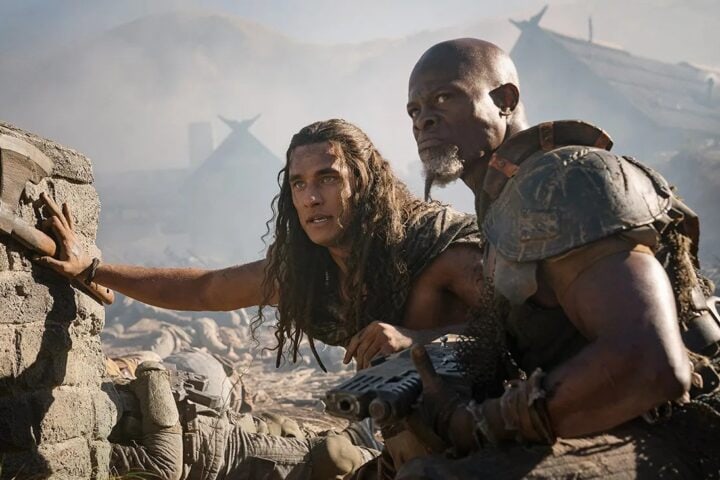Rome is starving. Early into Those About to Die, as the Roman Empire reels from civil war and rebellion in Judea, running its grain stores scarce, the people’s hunger for food swells into an appetite for revolt. Rome’s rulers turn to entertainment to pacify their citizens, eventually enlisting Tenax (Iwan Rheon), the rare self-made man who’s managed to claw his way toward the city’s elite, to orchestrate arena spectacles for the public. “I grew up in those stinking stands. I know what the mob wants to see,” Tenax tells his crew toward the end of the show’s first season. “Remember: Enough is good. More is better. Too much is perfect.”
Tenax’s directive encapsulates the ethos of Those About to Die, which treats viewers to excess and indulgence befitting ancient Rome. Created by Robert Rodat and based on Daniel P. Mannix’s book of the same name—which also inspired the screenplay of Ridley Scott’s Gladiator—this sword-and-sandal epic feels like a chalice overflowing with wine. Its plot is an unceasing, at times disorienting, torrent of schemes and romances and betrayals, but as it progresses, the series achieves striking emotional depth in its study of violence, subjugation, and ambition.
We begin in the twilight years of Emperor Vespasian (Anthony Hopkins), who, sensing the approaching end of his life and reign, mulls over which of his two sons he will name his heir: the military commander Titus (Tom Hughes), recently and triumphantly returned from razing Jerusalem, or the serpentine politician Domitian (Jojo Macari). Those About to Die mines immense pathos from a number of brotherhoods, with Titus and Domitian’s fraught but not entirely loveless relationship chief among them. Hughes and Macari lend compelling texture to the pair’s tension: Though Titus, detached and stoic, wants to trust his younger sibling, Domitian’s pride and anxious restlessness inspire warranted suspicion.
As Vespasian weighs his succession, enslaved Judeans build what will prove the emperor’s most lasting legacy: the Flavian Amphitheatre, better known as the Colosseum, whose construction he ordered to uplift Rome and give back to its people. (Vespasian’s relatively humble origins inform his also relatively populist leanings.) But for now, as the amphitheater inches skyward, Rome’s ruling class has a stranglehold on public entertainment through their control of the Circus Maximus, a stadium where enormous, zealous crowds cheer and bet on charioteers and fighters.
While its marketing emphasizes gladiatorial combat, the series focuses more on chariot racing. The track provides no shortage of adrenaline, as directors Roland Emmerich and Marco Kreuzpaintner, together with cinematographers Vittorio Omodei Zorini and Daniel Gottschalk, deftly frame the velocity and thrills of that proto-F1 deathsport. Hoofs slam against the dirt and drivers strain to direct the momentum of their horses, navigating pileups that swallow men and steeds alike as Andrea Farri’s propulsive score rises to reflect each bout’s mortal stakes.
A handful of patricians own Rome’s four chariot teams, including the wife-husband duo of Antonia (Gabriella Pession) and Marsus (Rupert Penry-Jones), who serve their bottom line and political interests with unblinking brutality. But there’s an awkward tonal dissonance between their viciousness and the show’s portrayal of the racing business: The competing organizations are named after and dressed in certain colors, and repeated references to the blue, white, and other factions give their contests the air of a summer camp activity.
Such silliness, like the sprinkling of Latin words and other period affectations in the dialogue, only fleetingly distracts from Those About to Die’s exploration of the Circus Maximus’s role as not just an escape for the city’s downtrodden populace, but a font of social opportunity. There, outsiders can distinguish themselves through mastery of their labor, like Andria (Eneko Sagardoy), Fonsoa (Pepe Barroso), and Elia (Gonçalo Almeida), endearing brothers who’ve come from Spain to sell their formidable horses.
The trio ends up in the stables of Scorpus (Dimitri Leonidas), a playboy hotshot prone to referring to himself in the third person—a practice that Leonidas’s easy charm renders more winsome than grating. Scorpus has undergone his own odyssey to win acceptance in Rome—and when a confluence of factors causes his star to sink, we learn that he, like many of those around him, has fashioned a proud persona to conceal vulnerable multitudes.
Tenax figures in as the proprietor of a gambling house and a rigger of races, sometimes with the help of Scorpus, an old friend. At first glance, Tenax’s intensity recalls that of Ramsay Bolton, the character that Rheon played on Game of Thrones. But the actor quickly distinguishes Tenax by betraying the quiet intelligence and kindness that his menacing glare belies.
Meanwhile, Cala (Sara Martins), a savvy polyglot, works to free her children from enslavement, including her son, Kwame (Moe Hashim), who’s been conscripted to fight as a gladiator. In time, Kwame forges a poignant bond with a warrior named Viggo (Jóhannes Haukur Jóhannesson), and the men mourn their separation from their families, confess their hopes and fears, and steel themselves for valiant deaths—all while patricians drink and fuck their way across the city, burning through unimaginable sums of money.
Those About to Die’s contrasts—between disembodied limbs and bodies tangled in an orgy, between a gladiator relishing what might be their last drink of wine and the elite guzzling spirits without a care in the world—give vivid shape to the cruelty at the heart of empire. Even Titus, who condemns the wasteful carnage of the arena, can barely contain his excitement when an underdog turns a duel around. As he beats on the arm of his seat in anticipation of blood and redemption, you may wonder: What’s a life to the throne? In Those About to Die, it’s meat thrown on the pyre to get the ravenous crowd roaring.
Since 2001, we've brought you uncompromising, candid takes on the world of film, music, television, video games, theater, and more. Independently owned and operated publications like Slant have been hit hard in recent years, but we’re committed to keeping our content free and accessible—meaning no paywalls or fees.
If you like what we do, please consider subscribing to our Patreon or making a donation.





